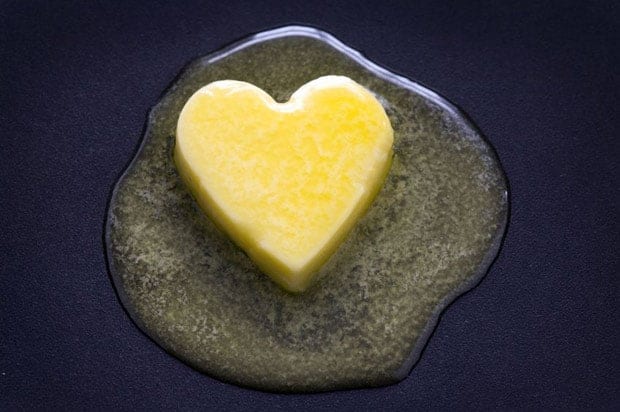It always surprises me when I meet someone who’s still afraid of saturated fat. I think it’s similar to being fearful of vampires, werewolves, or reality television. It’s literally all just made up. There’s nothing to be afraid of, I promise.
If you don’t believe me, then snuggle up close with your protective blanket, and listen to this…
For thousands upon thousands of years, humans have subsisted primarily on dietary fats. This was long before the idea that they were “dietary fats”. It was just food… and the richest source of energy found in food, by far.
Anyone schooled in the basic nutritional rhetoric will know that:
-Every gram of carbs yields 4 calories (energy)
-Every gram of protein yields 4 calories
-Every gram of fat yields 9 calories
Just from the perspective of pure nourishment and survival, you’re going to get more bang for your buck by eating foods high in fat. Our ancestors new this, and based their diets on this as much as possible.
What do the anthropological records say about their health? Well, they were actually more robust, fit, and largely unafflicted by the degenerative diseases we have today.
But don’t we live longer? Well, sure. But that depends on your definition of living. Depending on which time period you’re talking about, our ancestors had to deal with things ranging from dangerous climates, to invasions, to predation, to trauma, to lack of clean water, and the list goes on. Many of these things we don’t have to deal with today, or we have sound advancements that help us to successfully survive them.
But the food…
Yea, I’m pretty sure that wild buffalo meat is healthier than Kraft Velveta Shells & Cheese. But I’m just a silly rationalist.
We may believe that we are living longer, but in reality, many of us are dying longer. Though medical advancements, pharmaceutical drugs, and cozy living conditions can keep us alive, many of us have a quality of life that sucks as we get older (not a medical term, I know, but sucks is pretty much on the money.)
So, how does this all tie in to this anti-dietary fat paradigm? To get straight to the point, this concept that fat is dangerous for your health was cooked up by something called the “lipid hypothesis” and spread widely only a few decades ago by a diet researcher named Ancel Keys.
Keys was paramount in influencing government dietary standards, and promoting the idea that all-of-a-sudden fats are bad for you. Gradually, eating low-fat foods became the hot, trending way to eat, and our health declined epicly as a result of it.
We have seen shocking increases in obesity, heart disease, cancer, diabetes, and countless other preventable illnesses since our divorce from dietary fat. And, if you’re a rationalist like me, and Ancel Keys was supposed to be right, then this just doesn’t make an ounce of sense.
What Keys and many proponents of his recommendations failed to do was differentiate between saturated fat and trans fat.
This video from the good folks at ASAP Science will give you the goods on the difference between saturated fats and trans fats, so check it out before you continue.
I love the work put out by ASAP Science, and even though their chemical description of saturated and trans fat is great, they are flat out wrong about the idea that we still need to avoid saturated fat.
How could such smart people still make the mistake of believing old, bad science? The reality is, if you take smart people and teach them the wrong thing, they become very good at doing the wrong thing.
Plus, I know where they got their saturated fat dogma. I was taught the same thing from my university professors. I believed it whole heartedly too. But, I didn’t really get the full story.
In the video, ASAP Science describes why hydrogenated oils are bad for you. (You may call them hydrogenated oils, but I call them ho’s for short.) What they share here is absolutely true. In fact, hydrogenated and partially hydrogenated oils do the following when ingested:
- Lower HDL (“good”) cholesterol and raise LDL (“not-so-good”) cholesterol
- Increase free radical activity and cause DNA damage
- Cause inflammation and potential autoimmune responses
- Generate faulty lung surfactant leading to allergies and asthma symptoms
- Depress liver function leading to poor insulin breakdown and potential insulin resistance.
To top it all off, the groundbreaking Nurse’s Health Study of 80,000 women found that a 2% increase in trans fat consumption increased a woman’s risk of heart disease by 93%.
Basically, if you’re consuming margarine and other trans fats, you’ve got one foot in the grave and your other foot on some spilled vegetable oil.
Did you know that New York City banned trans fat from restaurants and bakeries almost 10 years ago?
Even though this is true, I still see trans fats in Twinkies every time I have to run into a drug store (to use the bathroom, of course.) The bread, crackers, cereal, macaroni & cheese, frozen pizza, donuts, cookies, and hundreds of other processed food products contain these dangerous trans fats, so make sure to keep an eye out for them.
Now what about saturated fats?
Let me wrap this thing up and put a nice little bow on it by sharing just how important they are.
Here are 5 critical benefits of saturated fats:
- Brain Health – The majority of your brain is fat and cholesterol. Weird, but true. And the vast majority of that fat is saturated fat. If you are trusting in a low saturated fat diet, you are missing out on an essential raw material your brain needs to grow, regenerate, and stay healthy. Telling someone they have a big fat brain is really a sexy compliment.
- Cardiovascular Health – Boom! In your face Ancel Keys. (Sorry, got a little excited there.) Saturated fats provide so many wonderful benefits for your heart and circulatory system. For example, lauric and stearic acids found in saturated fats can actually help regulate cholesterol levels. In addition, dietary saturated fats can reduce levels of lipoprotein(a), a known risk factor for cardiovascular disease.
- Bone Health – Saturated fat is necessary for calcium to be effectively incorporated into bone. Without fat, you’ll have boney bones. And with poor bone density comes increased risk of degeneration and injury.
- Immune Health – Without sufficient saturated fats in white blood cells, their ability to recognize and destroy foreign invaders like viruses, bacteria, and fungi is impaired.
- Nervous System Health – Think of saturated fat as the “insulation” coating for your nervous system (aka your internal wiring). When you lack this insulation you become more susceptible to external and internal stress. Certain saturated fats even function as signaling messengers themselves. A low saturated fat diet can cause poor communication between the cells of your body and result in several catastrophic problems.
Coconut oil, grass-fed butter, ghee, naturally raised animal fats, avocados, olives, nuts and seeds, and numerous other natural foods that contain saturated fats are fair game. True, depending on your unique metabolism, the amount of saturated fats that are right for you may vary. The co-writer of The Truth About Saturated Fats, Dr. Mary Enig, Ph.D., says that having even as much as 50 percent of the fats in your diet as saturated fats can be incredibly healthy for some people.
Regardless of where you lie in the spectrum, I hope that this article has restored some of your faith in the natural foods that our ancestors thrived on. From this day forward I hope that you do, indeed, live longer. And you enjoy a lifetime of health and vitality along with it.
Now, I’d love to hear from you. Do you seek out healthy saturated fats on a regular basis? Were you one of the passionate believers in the low-fat diet like I was? Let me know in the comments section below.








This article is spot on.
I went about a month with no saturated fat in my diet causing me to feel tired and I also had brain fog.
Dry skin dry hair added the fat back to my diet and it reversed, it was an experiment and I felt like crap.
All I ate was some cheese and a little meat within 20 minutes my energy came back needless to say…won’t be doing that again.
Hello! What are your thoughts on organic heavy whipped cream? I have been using a dash in my coffee instead of other creamers. I find that it keeps me feeling fuller longer and no side affects!
High in sat fat, but does the cream serve as an inflammatory?
Hi Sarah,
Dairy is very individualized. A lot of people don’t do well with dairy, but if you are someone who does fine with it then you can consume it in your morning coffee. It’s a lot better than using a lot of sugar found in the local Crack bucks.
I wouldn’t say it’s an “anti inflammatory” because it can contribute inflammation in people’s bodies if they are susceptible.
Just take notice if you break out in skin issues, get congested and sore throat, gas, or other symptoms from it.
Grassfed butter and MCT oil is a lot less triggering for individuals in their coffee.
Thank for this article. It’s unfortunate that many people are afraid of saturated fats. Saturated fat & cholesterol are the backbones of health as they regulate membrane fluidity, hormonal balance, and shield the nervous system. Good call.
PS. I do enjoy your sense of humor and your light language.
Well Done!
I am thinking like that for a long time! I am a psychic healer and The info that I get is the same you so well explained. Mental degenerative health diseases are very rooted in this lack of good fats as well. Thank you for this amazing article.
Awesome.Very informative.
I know this website offers quality based articles or reviews and additional
data, is there any other web site which presents such
stuff in quality?
I believe in consuming a combination of various types of fats and other foods. It’s good that you pointed out how our ancestors didn’t shop for food but you neglected to point out that they did eat plants. Hunter gathers did a large amount of gathering.
Hi Shawn,
I love listening to your show. I take my health very seriously and I have heard conflicting views on the topic of coconut oil. At this point, I really do not know what to believe. Here is a short video my Dr showed me when I brought up the topic. If you have the time to comment or direct me to overriding data, I would really appreciate it.
Thanks again, I really love listening to your show!!!!
https://nutritionfacts.org/video/what-about-coconuts-coconut-milk-and-coconut-oil-mcts/
So, clearly your podcast is amazing. I’m listening to your discussion around depression today. I’ve got to ask:
Is there a good list for the good fats we can eat?
I’m a person with an allergy to coconut oil unless it’s been cooked to death. I also have a dairy allergy
Are there other oils I can try out? A link?
Thanks for all you do.
This article is right on time. It has been years since I have eated butter on anything. I use coconut oil on baked potatoes, cook my eggs with coconut oil and whenever a recipe calls for butter I use coconut oil. I just bought some purple sweet potatoes the other day and it’s no way I’m not using butter on them. I felt like I was cheating on some unknown diet because I wanted the taste of butter. As I write this I have a potatoe baking and look forward to adding some butter. Organic grass fed, of
course. Thanks for this good insight.
This is awesome. The reason I’m following you today, is because I listened to this book: ‘The Big Fat Surprise: Why Butter, Meat & Cheese Belong in a Healthy Diet’ by Nina Teicholz. She documents very clearly, the power of Ancel Keys, how he has ruined health in America for years to come. Thanks for the great article and I’m still in the process of listening to all of your podcasts!
The overwhelming majority ‘Nutrition Scientists’ still believe saturated fat is bad for you. ‘Bloggers’ disagree.
I enjoy your work work Shawn. I respectfully disagree on this 1. Check out the research of Plant Positive on YouTube.
I lived the low fat diet for almost 10 years until about a year ago when I came across Vinnie Tortorich’s podcast which eventually led me to you Shawn. I’ve been training people for just over a year now and have been implementing a lot of your ideas on health and nutritionwith them and on my website Vermilionfitness.com.I appreciate everything you do and keep up the good work. And love that you are involved with Onnit. Big fan of there’s for a few months now.
OKAY, MY GURU… you open my eyes again. (smiling) i do eat plenty of sat.fats, avocado nuts, coconut oil, i will find the grass fed butter, is there really such a thing.. i use the earth balance soy free buttery spread rarely, what are your thoughts on this product. only 3 grms of sat fats. i loved this information and the video.
I’m glad to hear more people talking about the benefits of saturated fat. I cant believe how much misinformation is out there, even in a book I read on the longevity of the Okinawans, because it was written by doctors, recomended that people use canola oil instead of lard like the okinawans do. I also recently encountered people who strongly believed that aspartame was one of the safest food chemicals due to some “scientific studies” which proved so. I just wish everyone could be properly educated on what is actually healthy.
A book on how the Okinawans are doing it right… then the writers decide, “Well that part about eating natural fat is wrong. The Okinawans are right, just not about that part.” lol Sometimes you just have to laugh at the foolishness. Being aware, and having a broader perspective like you have is the real solution. We won’t have to teach people about health, if we teach them how to think for themselves.
You have freed your mind, Anthea!
Hi Shawn, thanks for all this brilliant information, I never get tired of reading and being reassured that I’m on the right path. I started eating the FLC way a year ago now I love butter, after being on “Low Fat Diets for years” and which I still blame for my heart attack, I have not looked back health and weight wise. I only wish our NHS Doctors and Nurses would embrace the fact that sat fat is healthy and good for you, I’m still being told to cut down on my saturated fats, even though the truth is being told all over the media, by other Doctors, health nutritionists, and experts like yourself. I just hope we all sing from the same page eventually and everyone is in a healthy place. All the best x
Wonderful share, Carol. And so happy for you, not just surviving, but finding a way to THRIVE after what you went through. You deserve so much love and admiration.
The health field is changing in life-affirming ways like never before… Every one of us is a catalyst for this… We make the biggest difference by living and breathing the things we believe in. And I thank you for doing your part!
About 20 years ago I was firmly converted to butter: At a cancer support workshop, every presenter–from the wholistic naturalpaths to the chemical/prescription-only doctors–every one said never use margarine, it’s too close to plastic and it feeds the cancer. Each cancer expert along the spectrum supported using butter over margarine.
Beth, that’s a really interesting personal experience with all of this. It can be rare that health practitioners from different spheres agree on the same topic. When they do, it’s definitely something to pay attention to. Thanks for sharing!
Up until 1977, when the United States Department of Agriculture declared saturated fats a health hazard, there was a healthy scientific debate regarding the supposed connection between clogged arteries and saturated fat intake. The confusion about saturated fats might have been averted if researchers studying human nutrition had paid closer attention to the animal nutrition research literature. For example, prior to 1973, animal feed researchers, testing alternatives to butter fat on veal calves, could not utilize polyunsaturated seed oils without making the calves sick and killing many of them. Beef tallow and lard caused no problems. In 1973 someone finally realized that seed oils need to be protected from oxidation, so they utilized vitamin E. Excerpt: “Weekly veterinary evaluation of the appearance and health of the calves revealed no abnormalities associated with the dietary treatments. The calves were examined for condition of coat, abnormalities of stance or gait, stiffness and evidence of muscular dystrophy, excitability or nervousness, and respiratory infections or abnormality. This result contrasts with the reports of others (Adams et al., 1959a,b; Gullickson, Fountaine and Fitch, 1942) who experienced poor weight gains, bad health, and considerable mortality of calves on rations high in unsaturated vegetable fat. All the calves in our study, whether fed milk containing high or normal amounts of polyunsaturated fatty acids, received supplemental vitamin E. The presence of this vitamin E during these early growth stages may be the explanation for the very satisfactory growth and weight gains during the milk feeding period, which contrasts with the growth deficiencies and health problems encountered by Adams et al.” http://www.journalofanimalscience.org/content/37/6/1419.full.pdf
In that same article the researchers said, “The possibility exists that food products containing high levels of polyunsaturated fatty acids may be useful in dietary prevention and alleviation of atherosclerosis. If clinicians prove an associative effect of dietary fatty acid saturation with incidence of cardiovascular disease, it will become desirable for dairy and beef producers to develop methods of increasing the degree of polyunsaturation in milk and meat fat.”
One wonders how levels of polyunsaturated fat intake that destroy the health of veal calves could possibly prevent heart disease in humans, especially without vitamin E supplementation. Excerpt from another article: “The current interest in some quarters in substituting unsaturated fatty acids for saturated fatty acids in the diet of man has encouraged research on means of increasing the proportion of unsaturated fatty acids in the fat of animal products. Means of achieving this change in fat composition by dietary alterations are being developed. Unfortunately, however, there is very little information about the effects of these changes either on the animals receiving the altered diet or on the consumer of the products from these animals. It seemed desirable, therefore, to study the effects of dietary fats, varying in degree of unsaturation that is a source of human food, that has been used as a model in lipid and cardiovascular studies, and for which information is already in hand relative to its response to various dietary lipids.” http://jn.nutrition.org/content/104/5/573.full.pdf
Both of these articles are worth reading in their entirety because they reveal some of the problems associated with excessive omega-6 linoleic acid intake.
David, thank you so much for sharing this. As you can imagine, I’ve come across this data several times, and kept needing to pull myself away from the conversation in this particular article. I feel that some of the earlier evidence of dietary animals fats being linked to disease is a result of the higher ratio of Omega-6 fatty acids found in the animal tissues that were fed abnormal diets.
I really hope that a study can be constructed that shows a clear discernment between eating animal foods raised on a natural diet and animal foods fed a diet of GMO corn and soy. This conversation still has a lot more to unfold!